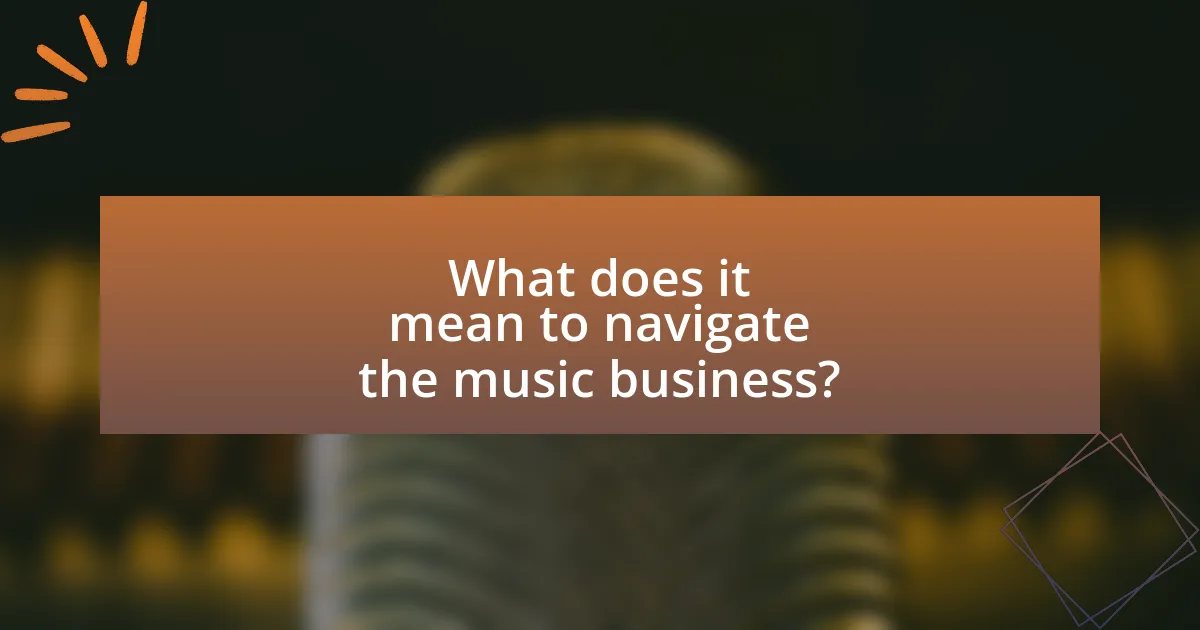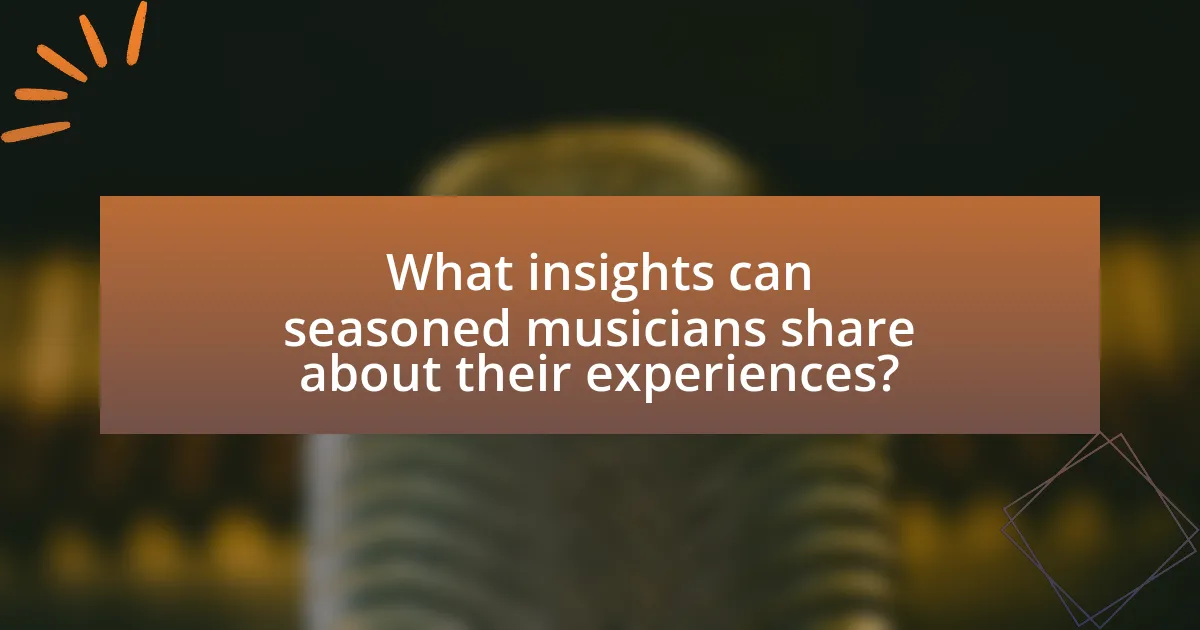The article “Navigating the Music Business: Advice from Seasoned Musicians” provides a comprehensive overview of the essential elements involved in successfully managing a music career. It covers key topics such as understanding contracts, marketing strategies, and the importance of networking within the industry. The article also highlights how seasoned musicians define success, the metrics they use to measure it, and the challenges they face, including financial instability and market saturation. Additionally, it offers practical tips for new musicians on building their brand, managing finances, and avoiding common pitfalls, while emphasizing the significance of mentorship and collaboration in achieving long-term success.

What does it mean to navigate the music business?
Navigating the music business means understanding and effectively managing the various aspects of the industry, including contracts, marketing, distribution, and networking. Musicians must familiarize themselves with legal agreements, such as recording contracts and publishing deals, to protect their rights and maximize their earnings. Additionally, successful navigation involves building relationships with industry professionals, such as agents, managers, and promoters, which can lead to opportunities for exposure and growth. Knowledge of digital platforms and social media is also crucial, as these tools are essential for reaching audiences and promoting music in today’s market.
How do seasoned musicians define success in the music industry?
Seasoned musicians define success in the music industry primarily as achieving artistic fulfillment and financial stability. They emphasize that success is not solely measured by commercial sales or chart positions but also by the ability to create meaningful music that resonates with audiences. For instance, many musicians highlight the importance of maintaining creative control over their work and building a loyal fan base, which can lead to sustainable careers. Additionally, statistics show that artists who engage directly with their fans through social media and live performances often experience greater long-term success, as they cultivate deeper connections and loyalty.
What metrics do musicians use to measure their success?
Musicians measure their success using metrics such as album sales, streaming numbers, concert attendance, social media engagement, and awards. Album sales provide a direct indicator of commercial success, while streaming numbers reflect audience reach and popularity on platforms like Spotify and Apple Music. Concert attendance indicates live performance success and fan engagement, with sold-out shows often signifying a strong following. Social media engagement, including likes, shares, and followers, demonstrates an artist’s influence and connection with fans. Awards, such as Grammys or Billboard Music Awards, serve as industry recognition of an artist’s talent and impact. These metrics collectively offer a comprehensive view of a musician’s success in the competitive music industry.
How does success vary across different genres?
Success varies significantly across different music genres due to factors such as audience size, revenue models, and cultural impact. For instance, pop music often achieves higher commercial success through mainstream radio play and streaming, leading to larger sales and concert attendance, while genres like indie or folk may prioritize artistic integrity and niche audiences, resulting in lower financial returns but potentially greater critical acclaim. According to a 2021 report by the International Federation of the Phonographic Industry, pop music generated over 40% of global recorded music revenue, illustrating its dominant market position compared to genres like classical or jazz, which attract smaller, dedicated fan bases.
What are the key challenges faced by musicians in the industry?
Musicians face several key challenges in the industry, including financial instability, market saturation, and the impact of digital streaming. Financial instability arises from inconsistent income streams, as many musicians rely on live performances and merchandise sales, which can fluctuate significantly. Market saturation is a challenge due to the overwhelming number of artists competing for attention, making it difficult for individual musicians to stand out. Additionally, the rise of digital streaming platforms has altered revenue models, often resulting in lower payouts for artists compared to traditional album sales. These challenges are supported by industry reports indicating that many musicians struggle to earn a sustainable living solely from their music.
How do financial pressures impact musicians’ careers?
Financial pressures significantly hinder musicians’ careers by limiting their ability to invest in essential resources such as marketing, production, and touring. When musicians face financial constraints, they often struggle to produce high-quality recordings or promote their work effectively, which can lead to reduced visibility and fewer opportunities for growth. According to a 2020 survey by the Music Industry Research Association, 70% of musicians reported that financial instability directly affected their ability to create and distribute music. This financial strain can also force musicians to take on additional jobs, detracting from the time and energy they can dedicate to their music careers.
What role does competition play in the music business?
Competition in the music business drives innovation and quality among artists and labels. It compels musicians to enhance their craft, leading to diverse musical styles and improved production values. For instance, the rise of streaming platforms has intensified competition, pushing artists to engage more with their audiences and market their music effectively. According to a report by the International Federation of the Phonographic Industry (IFPI), the global recorded music market grew by 7.4% in 2020, largely due to increased competition among streaming services, which incentivized artists to produce more compelling content. Thus, competition not only fosters creativity but also contributes to the overall growth of the music industry.
Why is networking important in the music business?
Networking is crucial in the music business because it facilitates connections that can lead to opportunities for collaboration, promotion, and career advancement. In an industry where relationships often dictate success, musicians rely on networking to gain access to producers, venues, and other artists. For instance, a survey by the Music Industry Research Association found that 70% of music professionals attribute their career advancements to networking efforts. This statistic underscores the importance of building and maintaining relationships within the industry to enhance visibility and create pathways for new projects.
How can musicians effectively build their professional networks?
Musicians can effectively build their professional networks by actively participating in industry events, collaborating with other artists, and utilizing social media platforms. Engaging in music festivals, workshops, and conferences allows musicians to meet industry professionals and peers, fostering valuable connections. Collaborating on projects with other musicians not only enhances creativity but also expands reach and visibility within the community. Additionally, leveraging social media platforms like Instagram, Twitter, and LinkedIn enables musicians to showcase their work, interact with fans and industry figures, and stay informed about opportunities. According to a survey by the Music Industry Research Association, 70% of musicians reported that networking at events led to significant career advancements.
What are the benefits of collaborating with other artists?
Collaborating with other artists enhances creativity and broadens exposure. When artists work together, they combine unique perspectives and skills, leading to innovative ideas and diverse artistic expressions. This collaboration can also expand each artist’s audience, as they introduce their followers to one another, increasing visibility and potential fan engagement. According to a study by the University of California, collaboration in creative fields often results in higher-quality outputs and increased satisfaction among participants, demonstrating the tangible benefits of such partnerships in the music industry.
What strategies do seasoned musicians recommend for success?
Seasoned musicians recommend several key strategies for success, including consistent practice, networking, and understanding the business side of music. Consistent practice enhances technical skills and creativity, which are essential for performance and songwriting. Networking with other musicians, producers, and industry professionals opens opportunities for collaborations and gigs, as evidenced by many successful artists who attribute their careers to connections made within the industry. Additionally, understanding contracts, royalties, and marketing strategies is crucial, as musicians who are informed about the business aspects are better equipped to navigate challenges and maximize their earnings.
How can musicians adapt to changes in the music industry?
Musicians can adapt to changes in the music industry by embracing digital platforms and diversifying their revenue streams. The rise of streaming services has shifted how music is consumed, prompting artists to leverage platforms like Spotify and Apple Music for wider reach. Additionally, musicians can explore merchandise sales, live performances, and crowdfunding to supplement income, as traditional album sales have declined. According to the Recording Industry Association of America, streaming accounted for 83% of the U.S. music industry’s revenue in 2020, highlighting the importance of adapting to this trend. By staying informed about industry trends and utilizing social media for marketing, musicians can effectively navigate the evolving landscape.

What insights can seasoned musicians share about their experiences?
Seasoned musicians can share insights about the importance of networking and building relationships in the music industry. They emphasize that connections often lead to opportunities for collaboration, gigs, and exposure, which are crucial for career advancement. For instance, a survey by the Music Industry Research Association found that 70% of musicians attribute their success to networking efforts. Additionally, experienced musicians highlight the necessity of adaptability, as the music landscape frequently changes due to technology and consumer preferences. They advise staying informed about industry trends and being open to evolving one’s sound or approach to remain relevant.
What lessons have seasoned musicians learned from their careers?
Seasoned musicians have learned the importance of adaptability in their careers. They recognize that the music industry is constantly evolving, requiring them to adjust their styles, marketing strategies, and business approaches to stay relevant. For instance, the rise of digital streaming platforms has shifted how music is consumed, prompting artists to embrace online promotion and distribution methods. Additionally, seasoned musicians emphasize the value of networking and building relationships within the industry, as collaborations and connections often lead to new opportunities. They also understand the significance of financial literacy, noting that managing income from various sources, such as live performances and royalties, is crucial for long-term sustainability. These lessons are supported by the experiences of artists who have successfully navigated changes in the industry, demonstrating that flexibility, relationships, and financial acumen are key to a lasting career in music.
How have past failures shaped their current approaches?
Past failures have significantly influenced seasoned musicians’ current approaches by instilling resilience and adaptability. For instance, many musicians who faced unsuccessful album releases or poor reception of their work learned to refine their creative processes and marketing strategies. This iterative learning process often leads to more authentic music that resonates with audiences, as evidenced by artists who have openly discussed their setbacks in interviews, highlighting how those experiences prompted them to innovate and connect more deeply with their fan base.
What advice do they give to new musicians entering the industry?
New musicians entering the industry are advised to focus on building a strong personal brand and networking effectively. Establishing a unique identity helps differentiate them in a competitive market, while networking opens doors to collaborations and opportunities. According to a survey by the Music Industry Research Association, 70% of successful musicians attribute their success to strategic networking and branding efforts.
How do seasoned musicians approach marketing and promotion?
Seasoned musicians approach marketing and promotion by leveraging their established networks, utilizing social media platforms, and engaging in strategic collaborations. They often prioritize building a personal brand that resonates with their audience, which is crucial for maintaining relevance in a competitive industry. For instance, a study by the Berklee College of Music highlights that 70% of successful musicians actively engage with fans on social media, enhancing their visibility and connection. Additionally, seasoned musicians frequently collaborate with other artists to tap into new audiences, as evidenced by the rise of cross-genre collaborations that have gained significant traction in recent years.
What are effective strategies for self-promotion in the digital age?
Effective strategies for self-promotion in the digital age include leveraging social media platforms, creating engaging content, and utilizing digital marketing tools. Musicians can use platforms like Instagram, TikTok, and YouTube to showcase their work, connect with fans, and build a personal brand. Engaging content, such as behind-the-scenes videos, live performances, and interactive posts, fosters audience connection and loyalty. Additionally, tools like email marketing and analytics can help track engagement and optimize promotional efforts. According to a 2021 report by the International Federation of the Phonographic Industry, 70% of music consumers discover new artists through social media, highlighting its effectiveness as a promotional strategy.
How can musicians leverage social media to reach their audience?
Musicians can leverage social media to reach their audience by creating engaging content that showcases their music and personality. By utilizing platforms like Instagram, TikTok, and Facebook, musicians can share behind-the-scenes footage, live performances, and personal stories, which fosters a deeper connection with fans. Statistics show that 70% of musicians believe social media is essential for building their fan base, as it allows for direct interaction and feedback. Additionally, targeted advertising on these platforms can help musicians reach specific demographics, increasing their visibility and engagement.
What role does mentorship play in the music business?
Mentorship plays a crucial role in the music business by providing guidance, industry insights, and networking opportunities to emerging artists. Experienced musicians often share their knowledge about the complexities of the industry, including contract negotiations, marketing strategies, and performance techniques. For instance, a study by the Berklee College of Music found that 70% of successful musicians attribute their achievements to mentorship relationships, highlighting the importance of having a mentor to navigate challenges and make informed decisions. This support system not only fosters talent development but also enhances the likelihood of long-term success in a competitive environment.
How can new musicians find mentors in the industry?
New musicians can find mentors in the industry by actively networking within music communities and attending industry events. Engaging with local music scenes, joining online forums, and participating in workshops can facilitate connections with experienced musicians. Research indicates that mentorship significantly enhances career development; for instance, a study by the National Endowment for the Arts found that 70% of artists who had mentors reported improved skills and opportunities. Additionally, reaching out directly to established musicians through social media platforms or professional networking sites can lead to valuable mentorship relationships.
What benefits do mentorship relationships provide?
Mentorship relationships provide significant benefits, including guidance, skill development, and networking opportunities. These relationships allow mentees to gain insights from experienced professionals, which can enhance their understanding of the music business. For instance, a study by the American Psychological Association found that mentorship can lead to increased job satisfaction and career advancement, with 75% of executives citing mentorship as a key factor in their success. Additionally, mentors can introduce mentees to valuable industry contacts, facilitating connections that may lead to collaborations or job opportunities.

What practical tips can musicians apply to navigate the music business?
Musicians can navigate the music business effectively by focusing on building a strong personal brand, networking strategically, and understanding the financial aspects of their careers. Establishing a unique identity helps musicians stand out in a competitive market, as evidenced by successful artists who leverage their distinct styles to attract audiences. Networking with industry professionals, such as producers and promoters, can lead to valuable opportunities, as many musicians find success through connections made at events or online platforms. Additionally, understanding contracts, royalties, and budgeting is crucial; for instance, musicians who educate themselves about their earnings can negotiate better deals, as highlighted by the fact that artists who actively manage their finances often report higher income levels.
How can musicians effectively manage their finances?
Musicians can effectively manage their finances by creating a detailed budget that tracks income and expenses. This approach allows musicians to understand their financial situation, prioritize spending, and allocate funds for essential areas such as recording, marketing, and living expenses. According to a survey by the Music Industry Research Association, 70% of musicians who maintain a budget report feeling more in control of their finances and less stressed about money. Additionally, musicians should consider working with a financial advisor who specializes in the music industry to gain insights into tax strategies, investment opportunities, and retirement planning, which can further enhance their financial stability.
What budgeting strategies should musicians consider?
Musicians should consider several budgeting strategies to effectively manage their finances. First, creating a detailed budget that outlines all income sources, including performances, merchandise sales, and streaming revenue, is essential. This allows musicians to track their earnings accurately. Additionally, musicians should allocate funds for essential expenses such as instrument maintenance, marketing, and recording costs, ensuring they do not overspend in any category.
Implementing the 50/30/20 rule can also be beneficial; this involves allocating 50% of income to needs, 30% to wants, and 20% to savings or debt repayment. Furthermore, musicians should regularly review and adjust their budgets based on changing income levels and expenses, which helps maintain financial stability. According to a survey by the Music Industry Research Association, 70% of musicians reported that effective budgeting directly contributed to their financial success, highlighting the importance of these strategies.
How can musicians prepare for financial instability?
Musicians can prepare for financial instability by diversifying their income streams. This includes exploring various revenue sources such as live performances, merchandise sales, streaming royalties, and teaching music lessons. According to a 2021 report by the Music Industry Research Association, musicians who engage in multiple income-generating activities are less likely to experience severe financial distress during economic downturns. Additionally, maintaining a budget and saving a portion of earnings can provide a financial cushion, allowing musicians to navigate periods of low income more effectively.
What are the best practices for maintaining a sustainable career in music?
To maintain a sustainable career in music, musicians should focus on diversifying their income streams, building a strong online presence, and continuously developing their skills. Diversifying income can include live performances, merchandise sales, streaming royalties, and licensing music for media, which helps mitigate financial risks associated with reliance on a single revenue source. A strong online presence, particularly through social media and music platforms, allows musicians to engage with fans, promote their work, and reach wider audiences, which is essential in today’s digital landscape. Continuous skill development, including songwriting, production, and performance techniques, ensures that musicians remain competitive and relevant in an evolving industry. According to a 2021 report by the International Federation of the Phonographic Industry, artists who actively engage with their audience online see a significant increase in fan loyalty and revenue opportunities.
How can musicians balance creativity with commercial demands?
Musicians can balance creativity with commercial demands by integrating their artistic vision with market trends. This involves understanding audience preferences while maintaining their unique sound. For instance, successful artists often analyze streaming data and social media feedback to identify popular elements in their genre, allowing them to create music that resonates commercially without sacrificing their artistic integrity. Additionally, collaborations with other artists can introduce new influences while appealing to broader audiences, exemplified by the rise of genre-blending in contemporary music.
What habits contribute to long-term success in the music industry?
Consistent practice and skill development are essential habits that contribute to long-term success in the music industry. Musicians who dedicate time daily to refine their craft, whether through instrument practice, vocal training, or songwriting, significantly increase their chances of achieving longevity in their careers. Research indicates that deliberate practice can lead to mastery, with studies showing that top musicians often engage in over 10,000 hours of focused practice (Ericsson et al., 1993). Additionally, networking and building relationships within the industry are crucial; successful musicians often collaborate with others, attend industry events, and maintain connections that can lead to new opportunities. This combination of skill enhancement and relationship-building forms a solid foundation for sustained success in the competitive music landscape.
What common pitfalls should musicians avoid in their careers?
Musicians should avoid common pitfalls such as neglecting their brand, failing to network effectively, and not understanding the business side of their careers. Neglecting their brand can lead to a lack of recognition and opportunities, as a strong personal brand is essential for standing out in a competitive industry. Failing to network effectively limits access to collaborations and industry connections, which are crucial for growth and exposure. Additionally, not understanding the business side, including contracts and royalties, can result in financial losses and exploitation, as evidenced by numerous artists who have faced legal issues due to inadequate knowledge of their rights and agreements.
How can musicians protect themselves from exploitation?
Musicians can protect themselves from exploitation by understanding their rights and utilizing legal contracts. Knowledge of copyright laws allows musicians to retain ownership of their work, while written agreements ensure clarity in business relationships. For instance, the U.S. Copyright Office states that musicians automatically own the rights to their original compositions upon creation, which reinforces the importance of registering their works to establish legal proof of ownership. Additionally, seeking legal advice before signing contracts can help musicians identify potentially exploitative terms, ensuring fair compensation and control over their artistic output.
What mistakes do new musicians often make, and how can they be avoided?
New musicians often make the mistake of neglecting their branding and online presence, which can hinder their visibility and growth in the music industry. To avoid this, they should invest time in creating a cohesive brand identity, including a professional website and active social media profiles that showcase their music and personality. Research indicates that 70% of music consumers discover new artists through social media, highlighting the importance of a strong online presence. Additionally, new musicians frequently underestimate the value of networking; building relationships with industry professionals can lead to opportunities for collaboration and exposure. Engaging in local music scenes and attending industry events can help mitigate this mistake.
